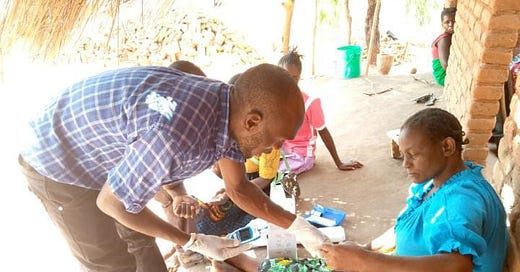Karonga Diocese praised for mobile clinics improving rural health care in Malawi
Catholic Church has been lauded for its efforts in bringing health care services to rural areas in Malawi's Chitipa, Karonga, and Rumphi districts through mobile clinics, writes Victor Musongole.
Malawi-The Karonga Diocese of the Catholic Church has been lauded for its efforts in bringing health care services to rural areas in Malawi's Chitipa, Karonga, and Rumphi districts through mobile clinics, writes Victor Musongole.
The clinics target non-communicable diseases such as cervical cancer, diabetes, and hypertension, which are becoming increasingly prevalent in the country.
According to estimates, 33% of adults aged 25–64 in Malawi have hypertension, 5.6% are diabetic, and approximately 5,000 new cases of cancer are registered each year.
The mobile clinics, which operate in three centres, aim to reduce the distances people in hard-to-reach areas must travel to hospitals.
They have been particularly beneficial to rural communities, such as that of Group Village Headman Zondani Maduna Mkandawire under STA Njikula Mkandawire, who says the clinics have saved his subjects more than K8000 on a single trip to the hospital.
Kennedy Nyirenda, Jalawe Hospital in-charge, and Health Advisory Committee Chairperson Loyd Harawa have also praised the initiative, noting that people are now able to access medical drugs that are sometimes unavailable at Jalawe Health Centre.
Karonga Diocese Public Health Officer Frank Mawiliga emphasized that the mobile clinics are part of a wider effort to improve health care in Malawi, which is grappling with a heavy burden of disease due to delays in seeking care, a poor referral system, and a lack of appropriate drugs, equipment, and staff capacity.
The country's health care delivery system is composed mainly of government facilities, the Christian Health Association of Malawi, and some private, for-profit providers.
However, the government has been unable to absorb all the health workers coming out of training institutions in recent years, according to a World Health Organization report from 2022.
"People are accessing different services that were initially found at Rumphi Hospital. This initiative encourages people to come and get tested for various illnesses as well as to receive medicines on time," said Harawa.
Mike Mughogho, hospital in charge of Mahowe Health Center in Chitipa, stated that the project is helping to reduce the pressure the hospital has had due to challenges such as lack of equipment.
Commenting on the same, Weston Bonface Kaira, Secretary for Mahowe Area Development Committee, said, "The initiative is helping in making access to health services very easy, as people are no longer travel long distances to Mahowe and Nthalire Health Centre. Most areas here under GVH Kopakopa are hard to reach, so the mobile clinic is reaching out to some of these areas. We hope this program will continue for a long time."
Hilda Kalambo, hospital in-charge of Hara Health Center in Karonga, stated that the mobile clinic has assisted people to have steady and consistent access to medicines.
"People are no longer travelling to Chilumba Health Center to get their usual supply of medicine. We had some patients delaying to get medicines due to lack of money for transport but now they access these medicines at the right time through mobile clinics which go right into their localities," Kalambo said in an interview.
Mawiliga added that the project, which started late last year, has received a good response as more people are accessing quality health services once a month in all three districts.
The community transformation project is funded by US Catholic Cross Outreach and is being implemented in Karonga, Rumphi, and Chitipa for a period of 5 years.




We wish you all the best as you assist the most helpless people in the remote areas and we pray for the partners of the said diocese